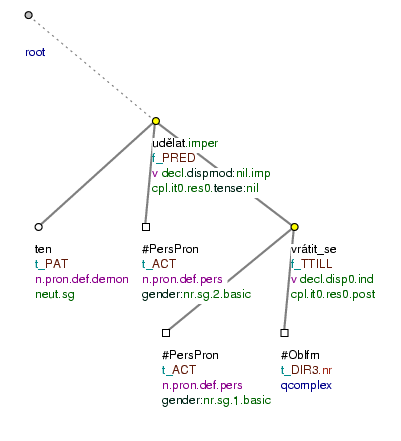- Definition of the
TTILLfunctor -
The
TTILLfunctor (temporal: till) is a functor for a (free) temporal modification answering the question "till when?".
A modification with the TTILL functor expresses the end of the event (expressed by the governing word) either by direct specification of the moment (do pěti hodin (=lit. till five o'clock), dodnes (=till today)), or by specifying the temporal relation to another event (do odjezdu (=till the departure), do snídaně (=till breakfast)).
Forms. The basic forms of TTILL modifications are:
-
prepositional phrase.
The most common forms:
do+2 Do večera budu v Praze. (=Till the evening I will be in Prague.) k+3 K tomuto termínu bylo podáno 2173 žádostí. (=2173 applications have been submitted by this date.) po+4 Pracoval až po tu chvíli. (=He was working till that moment.) -
adverbial expressions.
Examples:
Až doteď.
TTILLbyl spokojen. (=lit. Till now (he) has_been satisfied.)Dodnes.
TTILLnevím, kde je. (=lit. Till_today (I) do_not_know where (he) is.)Dokdy.
TTILLtu můžete zůstat?(=lit. Till_when here can_(you) stay?)Doposud.
TTILLjsme nepřišli na řešení. (=lit. So_far (we) - have_not _arrived at (a) solution.) -
dependent clause.
The most common forms:
až Za rohem na ně počká, až to skončí. (=Round the corner he will wait for them till it ends.) dokud Nedělej to, dokud se nevrátím. (=Don't do it till I get back.) než / nežli Potomci posbírali nějaké vědomosti, než převzali rodinný majetek a začali na něm sami hospodařit. (=The descendants gathered some knowledge before they took over the property of the family and started to manage it on their own.) A temporal modification with the
TILLfunctor can also be expressed by a dependent clause introduced by the subordinating connectives dokud (=till/until) and než (=before). The governing verb of the dependent clause is usually perfective; the conjunction než (=before) requires a positive verb form while the conjunction dokud (=till/until) requires a negative verb form.Example:
Udělej to, než se vrátím.
TTILL(=lit. Do it before (I) - get_back.) Fig. 7.19NB! In the constructions with the expressions do té doby, co (=lit. till the time when); do toho okamžiku, kdy (=lit. till the moment when) etc. the dependent clause is not interpreted as a temporal clause but its effective root node is rather assigned the
RSTRfunctor; e.g.:Budeme to auto využívat do té doby.
TTILL, co bude jezdit.RSTR(=lit. (We) will the car use till the time when (it) - goes.)
Agreeing form of an adjective. With nouns denoting events (nouns ending with -ní and tí; see Section 2.4.3.3, "Functors assigned to the non-valency modifications of nouns referring to events"), THL modifications can also be expressed by agreeing forms of adjectives (however, this is rather rare).
Example:
dosavadní.TTILL fungování (=lit. (the) existing operation)
Border with the THL functor. The TTILL functor is close esp. to temporal modifications with the meaning "how long?" (THL; see Section 3.4, "THL"). See Section 3.4.1, "Borderline cases with the THL functor".
Dependent clause with conjunction "dokud (=till)". A dependent temporal clause introduced by the connective dokud (=till) can express both the meaning TTILL and THL. See also Section 3.4.1, "Borderline cases with the THL functor".
Border with the TWHEN functor in the constructions with conjunction "než (=before)". A dependent temporal clause with the conjuction než (=before) borders on temporal clauses that have the meaning of the TWHEN functor (see Section 3.1, "TWHEN"). Cf.:
-
Než se naobědval.
TWHEN, umyl si ruce. (=lit. Before (he) - had_lunch, (he) washed his hands.) -
Udělej to, než se vrátím.
TTILL(=lit. Do it before (I) get_back.)
